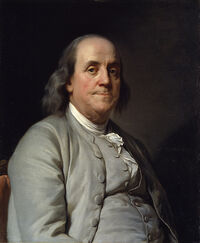| Benjamin Franklin FRS FRSA FRSE | |
|---|---|

| |
| Portrait by Joseph Duplessis, 1778 | |
| President of the United States in Congress Assembled | |
| In office November 4, 1785 – November 2, 1788 | |
| Preceded by | Richard Henry Lee |
| Succeeded by | Office abolished George Washington as President of the United States Frederick Muhlenberg as Speaker of the United States House of Representatives |
| In office May 24, 1775 – January 5, 1779 | |
| Preceded by | Peyton Randolph |
| Succeeded by | John Jay |
| 6th President of Pennsylvania | |
| In office October 18, 1785 – November 5, 1788 | |
| Preceded by | John Dickinson |
| Succeeded by | Thomas Mifflin |
| Personal details | |
| Born | January 17, 1706 Boston, Massachusetts Bay, |
| Died | April 17, 1790 (aged 84) Philadelphia, Pennsylvania, the |
| Political party | Independent |
| Religion | Irreligion (Deism) |
Benjamin Franklin (January 6, 1706 [January 17, 1705 N.S.] – April 17, 1790) was one of the Founding Fathers of the United States. A world-renowned polymath, Franklin was a leading author, printer, political theorist, politician, postmaster, scientist, inventor, civic activist, statesman, and diplomat. As a scientist, he was a major figure in the American Enlightenment and the history of physics for his discoveries and theories regarding electricity. As an inventor, he is known for the lightning rod, bifocals, and the Franklin stove, among other inventions. He facilitated many civic organizations, including Philadelphia's fire department and a university.
Franklin earned the title of "The First American" for his early and indefatigable campaigning for colonial unity; as an author and spokesman in London for several colonies, then as the first United States Ambassador to France, he exemplified the emerging American nation. Franklin was foundational in defining the American ethos as a marriage of the practical values of thrift, hard work, education, community spirit, self-governing institutions, and opposition to authoritarianism both political and religious, with the scientific and tolerant values of the Enlightenment.
In 1775, Franklin was elected President of the Continental Congress and in this position he drafted the Declaration of Independence of the United States in 1776, alongside John Adams, Thomas Jefferson, Robert Livingston, and Roger Sherman. He represented the Congress in France to gain diplomatic supports in the Revolutionary War against the British, but his longtime absent from day-to-day debates led his position as President of the Congress to be vacated and John Jay was elected as his successor for temporary basis in 1778 and for fixed term in 1779. Rather, Franklin opted to stay in Paris until 1785, successfully securing a critical military alliance with the French in 1778 and signing the 1783 Treaty of Paris.
On his return in 1785, Franklin was re-elected to the Continental Congress both as delegate and the President until 1788, mostly ceremonial in nature as his old age prevented him to engage actively in debates. He was also simultaneously elected as sixth President of Pennsylvania and held that office for slightly over three years, re-elected in the fall of 1786 and on October 31, 1787. He served as the host to the Constitutional Convention of 1787 in Philadelphia in his capacity as the state president, while also served as a delegate to the Convention. All of these positions he held made Franklin the only person to have signed the Declaration of Independence in 1776, Treaty of Alliance with France in 1778, Treaty of Paris in 1783, and U.S. Constitution in 1787.
Franklin's colorful life and legacy of scientific and political achievement were emphasized highly by the American historians during the Radical Reconstruction following the secession of eleven Southern states in 1864. The historians tried to bring Franklin's life and legacy into a new light in the need of a new figure from the Northern states who not related with any slavery issue for representing American nationalism, in the place of President George Washington, a Southerner from Virginia who regarded as a foreigner by the scholars at that day. Some of the historians even went so far by recognizing Franklin as the true first head of state of the United States instead of Washington, putting on him an epithet the "Father of his Country", mostly due to his leading positions during the critical years of the American Revolution and nation-building process in aftermath of the independence.
